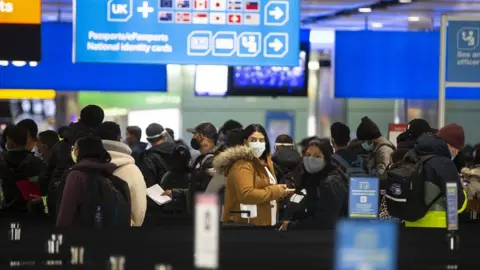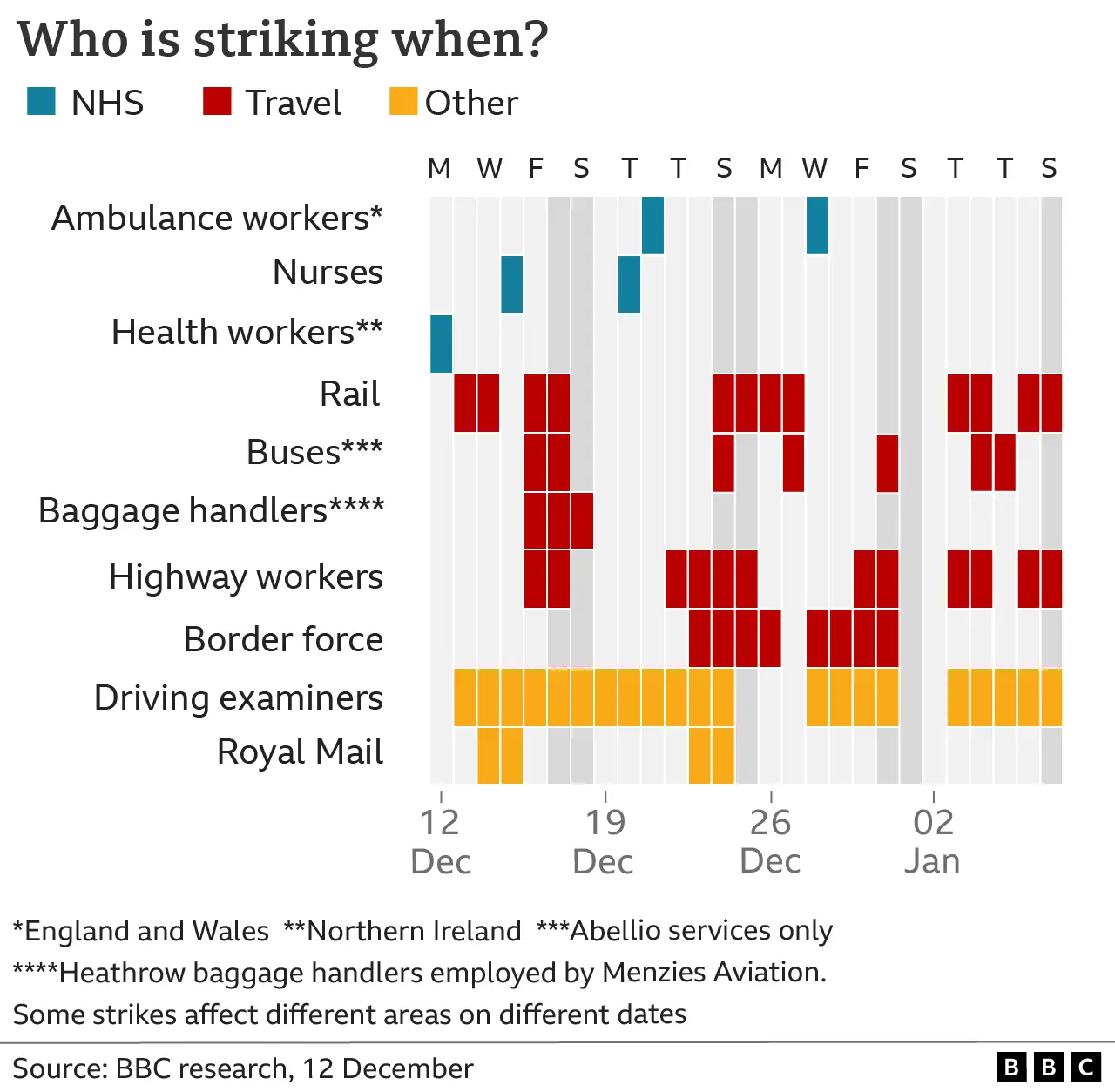Ministers hold emergency Cobra meeting amid wave of strikes
 Getty Images
Getty ImagesThe government have been discussing contingency plans for upcoming strikes, including using the military and civil servants to cover Border Force staff, at an emergency Cobra meeting.
The armed forces will also be deployed to hospital trusts ahead of an ambulance strike, the government says.
But Downing Street warned there would still be "serious disruption".
Cobra is an emergency response committee made up of ministers, civil servants and others.
It comes amid a wave of strikes over pay this month from nurses, paramedics, rail workers, and Border Force staff.
Cabinet Office minister Oliver Dowden, who chaired the meeting, urged unions to call off the strikes.
He said the government had been "fair and reasonable" by honouring the recommendations of independent pay review bodies.
Mr Dowden said ministers were "straining every sinew" to minimise the risks from strikes but it would never be able to eliminate them.
The prime minister's official spokesman stressed that even with members of the armed forces driving ambulances, the number available to attend calls would be reduced "significantly".
The country is facing "a challenging number of days", he said.
Border Force officers employed by the Home Office are set to walk out at Gatwick, Heathrow, Manchester, Birmingham and Cardiff airports for eight days from 23 December to New Year's Eve.
Members of the Public and Commercial Services Union (PCS) - who represent 75% of all passport control staff - voted to take action in support of a 10% pay rise which they say will help border workers who are "struggling with the cost-of-living crisis".
Some military personnel are already being trained up as part of contingency planning in a bid to avoid widespread disruption at Christmas.
Armed forces will be sent to hospital trusts to familiarise themselves with vehicles ahead of an ambulance worker strike in England and Wales on 21 and 28 December.
Paramedics and control room staff will walk out in coordinated strike action by the three main ambulance unions - Unison, GMB and Unite - in a dispute over pay. The action will affect non-life threatening calls only.
Nurses in England, Wales and Northern Ireland are also set to strike on 15 and 20 December.
Unions are calling for bigger pay increases to help their members cope with rising prices, but Downing Street has argued that "inflation is everyone's enemy" and meeting union calls would embed higher prices.
No 10 also said talk of coordinated strikes was "concerning" as that would "exacerbate the misery" the public is facing.
Prime Minister Rishi Sunak has previously pledged to introduce "new tough" anti-strike laws.
Some unions have said instead of meeting each other, ministers should meet them and negotiate pay.
The Royal College of Nursing met Health Secretary Steve Barclay earlier but the union's general secretary Pat Cullen said he refused to discuss pay, which she described as "disrespectful".
She said planned strikes on 15 December would now go ahead.
"I needed to come out of this meeting with something serious to show nurses why they should not strike this week. Regrettably, they are not getting an extra penny," she said.
"I expressed my deep disappointment at the belligerence - they have closed their books and walked away."
Ms Cullen has previously said this week's strikes could be paused if the health secretary "seriously" negotiated over pay.
A Department of Health spokesperson said that during the meeting Mr Barclay reiterated the government's position that it had agreed to the recommendations of the independent pay review body and that any further pay increase would mean taking money away from clearing the post-Covid backlog.
The spokesperson said he would continue to engage with the union on non pay-related issues.
The nurses' union have called for their members to be given a pay rise of 5% above the RPI inflation rate, which in October was 14.2%.
Meanwhile, members of health unions Unison and Unite have voted to accept the Scottish government's pay offer of around 7.5%. Members of the Royal College of Nursing and GMB are still voting on whether to accept.
Shadow health secretary Wes Streeting said a Labour government would not be able to afford such a rise but added that it "would be willing to meet and negotiate" to avoid a strike.
"I think the government's stubborn refusal to engage in serious negotiations shows they are spoiling for a fight and they want to blame nurses, blame paramedics and blame NHS staff for challenges in NHS services that are the direct fault and responsibility of 12 years of Conservative mismanagement," he said.
"Frankly I think that's disgusting."
Unison's head of health Sara Gorton said: "The wage rise given to health workers this year simply hasn't been enough to stop staff leaving in droves. Without enough employees in the NHS, patients will go on waiting too long for ambulances and for treatment to start."
"Instead of putting plans in place for the strike days, ministers should be concentrating all their efforts on ending the disputes," she added.
 .
.